北师大版(2019)选择性必修第二册 Unit 4 Humour Lesson 3 My Favourite Comedian课件(共57张PPT,内镶嵌视频和音频)
文档属性
| 名称 | 北师大版(2019)选择性必修第二册 Unit 4 Humour Lesson 3 My Favourite Comedian课件(共57张PPT,内镶嵌视频和音频) |
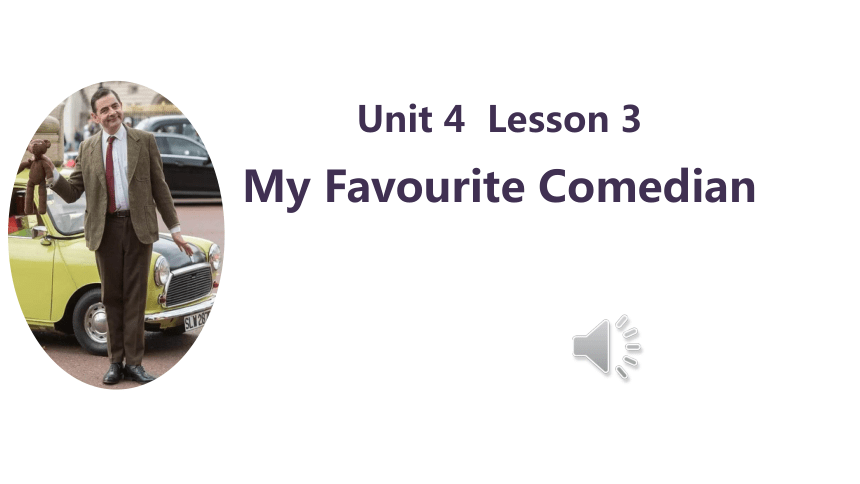
|
|
| 格式 | pptx | ||
| 文件大小 | 40.3MB | ||
| 资源类型 | 教案 | ||
| 版本资源 | 北师大版(2019) | ||
| 科目 | 英语 | ||
| 更新时间 | 2024-01-06 21:00:18 | ||
图片预览

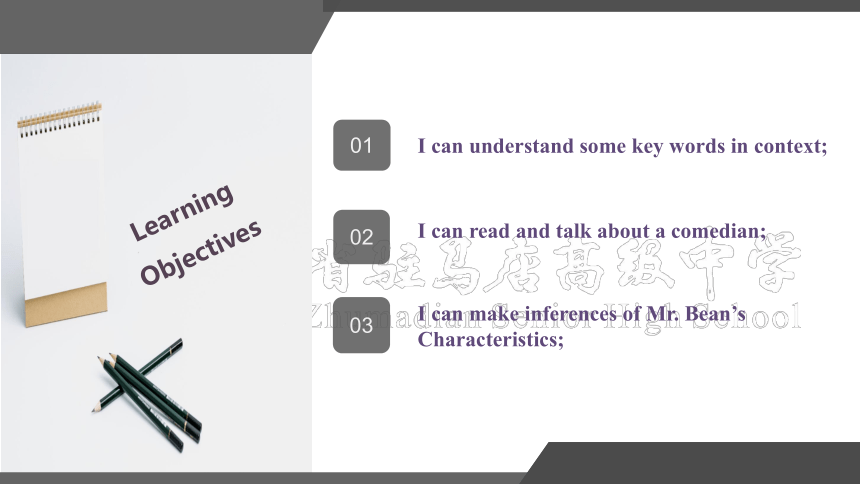
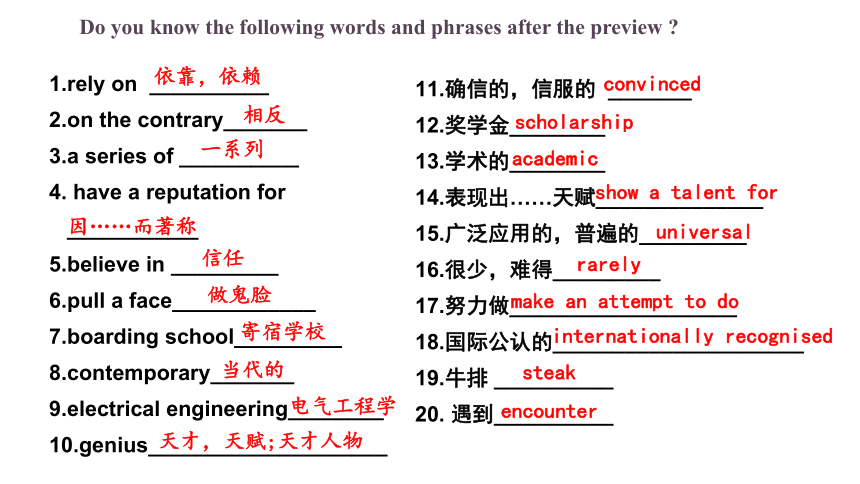
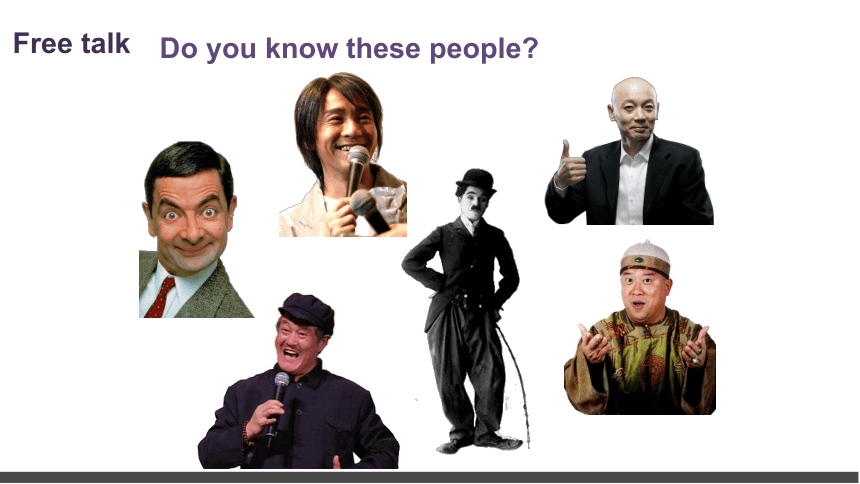
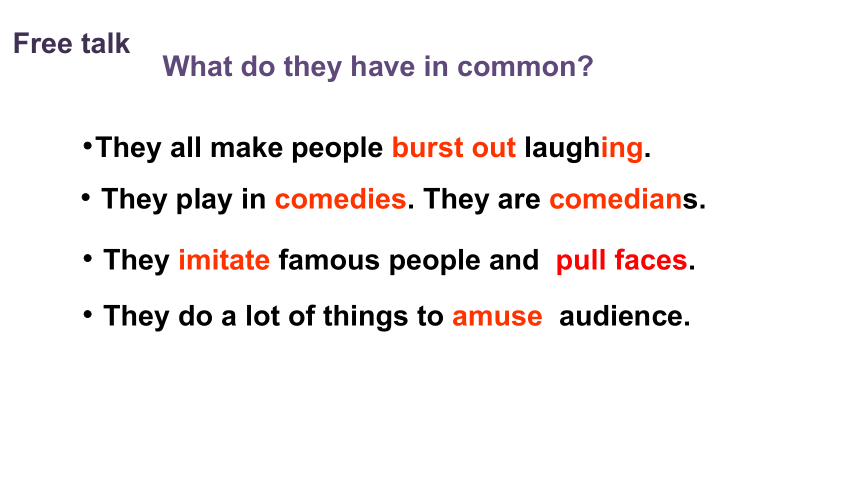

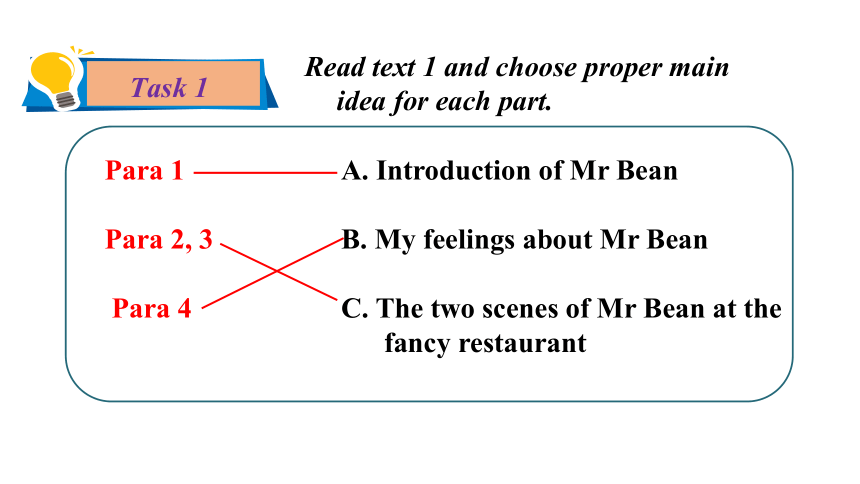
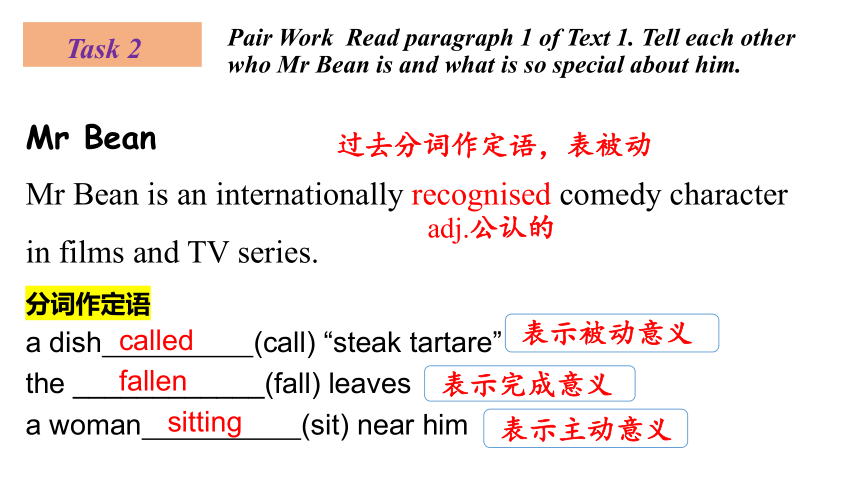
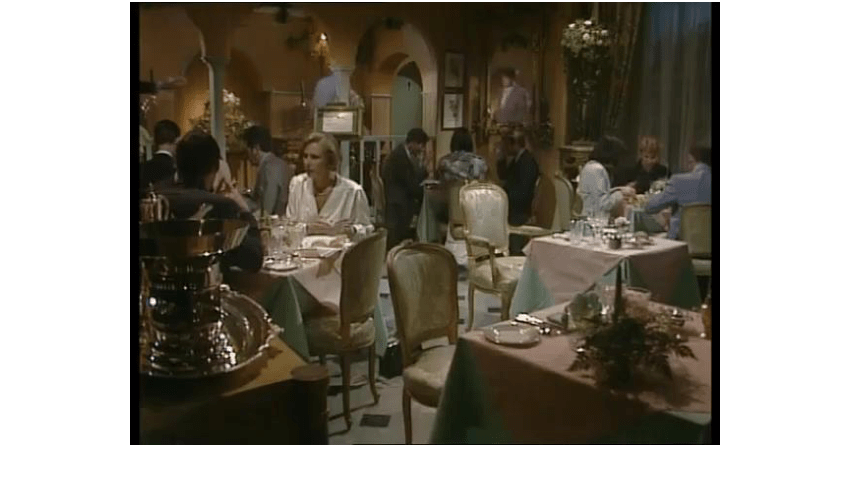
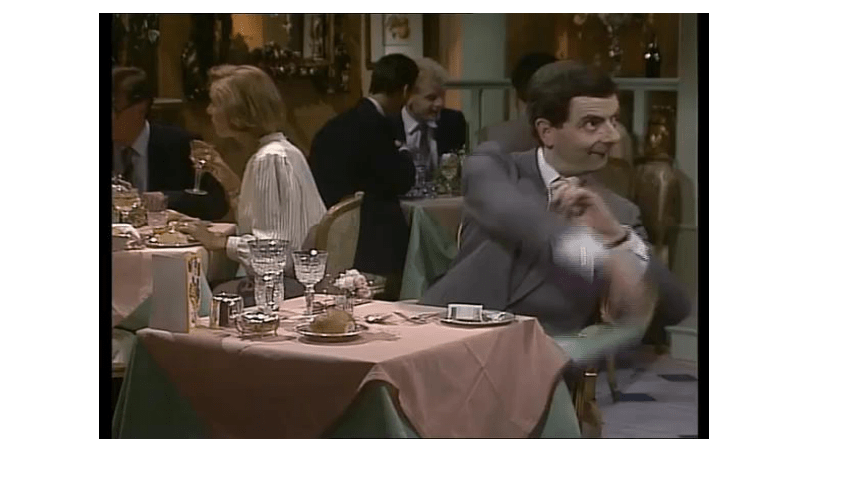
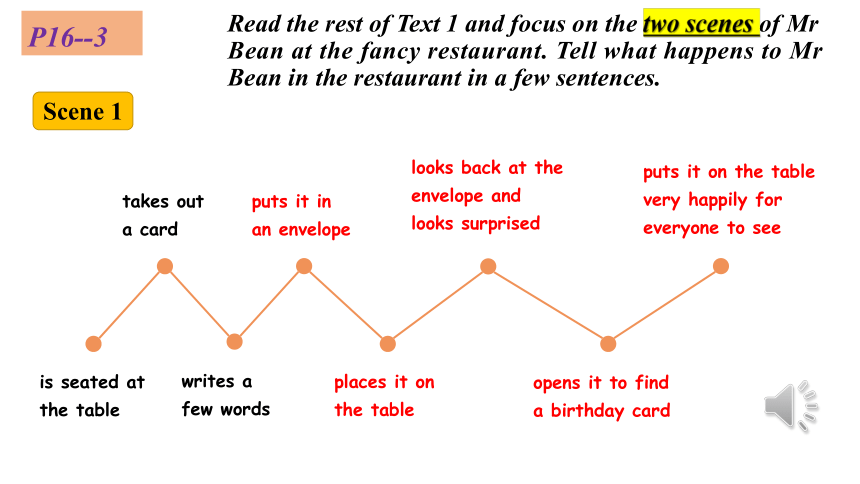
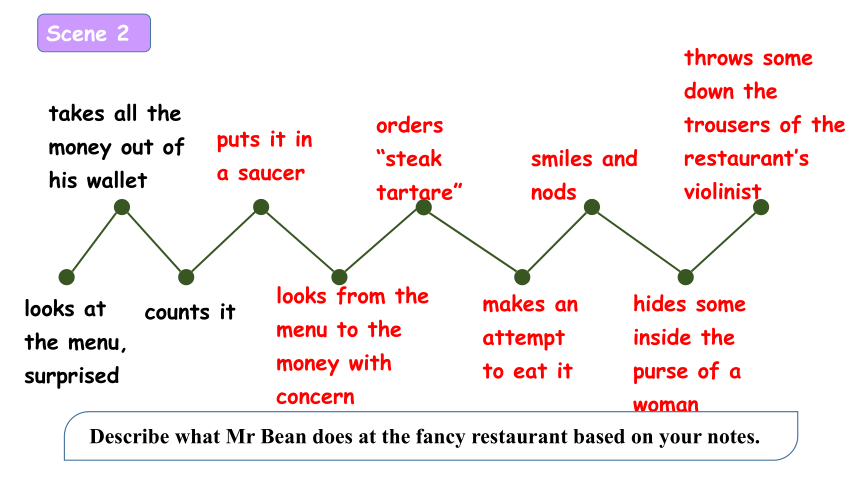
文档简介
(共57张PPT)
Unit 4 Lesson 3
My Favourite Comedian
Learning
Objectives
01
02
03
I can understand some key words in context;
I can read and talk about a comedian;
I can make inferences of Mr. Bean’s
Characteristics;
1.rely on __________
2.on the contrary_______
3.a series of __________
4. have a reputation for
___________
5.believe in _________
6.pull a face____________
7.boarding school_________
8.contemporary_______
9.electrical engineering________
10.genius____________________
依靠,依赖
11.确信的,信服的 _______
12.奖学金________
13.学术的________
14.表现出……天赋______________
15.广泛应用的,普遍的_________
16.很少,难得_________
17.努力做___________________
18.国际公认的_____________________
19.牛排 __________
20. 遇到__________
相反
一系列
信任
做鬼脸
寄宿学校
当代的
天才,天赋;天才人物
convinced
scholarship
academic
因……而著称
universal
rarely
电气工程学
make an attempt to do
show a talent for
internationally recognised
steak
encounter
Do you know the following words and phrases after the preview
Free talk
Do you know these people
Free talk
What do they have in common
They all make people burst out laughing.
They play in comedies. They are comedians.
They imitate famous people and pull faces.
They do a lot of things to amuse audience.
Look at the photo. Answer the questions.
Activate and Share
Who is he
What’s he famous for
What’s his nationality
What TV series and films has he acted in
What do you think of his performance
He is Rowan Atkinson.
He is English.
The character Mr Bean he acted.
TV series and films of Mr Bean.
Read text 1 and choose proper main idea for each part.
A. Introduction of Mr Bean
B. My feelings about Mr Bean
C. The two scenes of Mr Bean at the
fancy restaurant
Para 1
Para 2, 3
Para 4
Read and Explore
Task 1
Pair Work Read paragraph 1 of Text 1. Tell each other who Mr Bean is and what is so special about him.
Mr Bean
Mr Bean is an internationally recognised comedy character in films and TV series.
过去分词作定语,表被动
分词作定语
a dish (call) “steak tartare”
the ____________(fall) leaves
a woman (sit) near him
called
fallen
表示被动意义
表示完成意义
sitting
表示主动意义
adj.公认的
Task 2
Read the rest of Text 1 and focus on the two scenes of Mr Bean at the fancy restaurant. Tell what happens to Mr Bean in the restaurant in a few sentences.
Scene 1
is seated at the table
takes out a card
writes a few words
puts it in an envelope
places it on the table
looks back at the envelope and looks surprised
opens it to find a birthday card
puts it on the table very happily for everyone to see
P16--3
Scene 2
looks at the menu, surprised
takes all the money out of his wallet
counts it
puts it in a saucer
looks from the menu to the money with concern
orders “steak tartare”
makes an attempt to eat it
smiles and nods
hides some inside the purse of a woman
throws some down the trousers of the restaurant’s violinist
Describe what Mr Bean does at the fancy restaurant based on your notes.
Read Text 1. Make inferences about Mr Bean and the author.
1 Why does Mr Bean go to a fancy restaurant on this particular day
To celebrate his birthday.
2 Does Mr Bean have many friends How do you know
Mr Bean doesn’t have any friends. He goes to the restaurant alone and writes a card to himself but he pretends he receives the card.
3 Why does Mr Bean order “steak tartare”
Maybe it is the only dish he could pay for.
P16--5
4 Why does Mr Bean pretend to like the food when the waiters ask him
Because he wants to be elegant.
5 Why does the author say that he wouldn’t want to meet someone like Mr Bean in real life
Mr Bean’s manners are not socially acceptable so it would be embarrassing to sit with him at a dinner table.
Read Text 1. Make inferences about Mr Bean and the author.
Mr. Bean
Mr Bean is an internationally recognised comedy character in films and TV series.
He has a reputation for constantly encountering awkward situations, which greatly amuses audiences of all nationalities and cultures.
因……而闻名
which引导非限制性定语从句
他的著名之处在于总是遇到尴尬的情境,这使来自不同国家、不同文化背景的观众都觉得非常好笑。
His humor is always made clear through a series of simple and funny acts that rely purely on body language that is universal.
that引导定语从句
that引导定语从句
一系列
make +宾语(sb./sth.) +宾补(adj.)
通过
憨豆先生的幽默总是通过一连串简单、可笑的动作清晰地表达出来,完全依靠肢体语言这一全世界都能理解的方式(普遍的)。
依靠
One of my favourite episodes was Mr Bean in a fancy restaurant. After being seated at his table, Mr Bean takes out a card, writes a few words on it, puts it in an envelope and places it on the table.
“……之一” 后跟名词复数
就坐
and连接并列谓语,形式保持一致
我喜欢的一集是憨豆先生在一家高档餐厅用餐的故事。在餐厅里就座后,憨豆先生拿出一张卡片,在上面写了几个字,塞进信封,放在桌子上。
Mr Bean takes out a card, writes a few words on it, puts it in an envelope and places it on the table.
并列谓语动词
(1)主语发出一连串动作,用and连接
(2)动词时态结构要一致
(3)并列谓语动词必须用连词,若无连词,则为非谓语动词
1.The doctor examined his bleeding leg and ____(tell) him that he need a surgery at once.
2.My friend rushed into the classroom, ____________(whisper) to me that our favourite comedian would perform in our school.
told
whispering
After a moment, he looks back at the envelope but this time he looks surprised, as if he did not know it was there. He opens it to find a birthday card and very happily puts it on the table for everyone to see.
似乎,,好像
过了一会儿,他再看那个信封,露出惊讶的表情,好像完全不知道它在那里。打开信封后,发现是张生日贺卡,他便高兴地把贺卡放在桌上向大家炫耀起来。
不定式做结果状语
过了一会
When he looks at the menu, an astonished look
quickly appears on his face. He takes all the money out of his wallet, counts it and puts it in a saucer. He then looks from the menu to the money with concern until he finds one thing that makes him smile.
修饰look, expression, voice等表情或声音时,用指人的-ed结尾的adj.
从……到……
担忧地
that引导定语从句
Then he orders a dish called “steak tartare’’. When the dish arrives, he is shocked to discover that “steak tartare” is actually raw hamburger.
过去分词短语做后置定语: 表被动
that引导宾语从句
很震惊地…
He makes an attempt to eat it, but it is clear (from the look on his face as he is chewing) that he finds the taste truly awful.
尝试做某事= attempt (v.) to do
他尝了尝,从他那咀嚼的表情就能清晰地看出,这东西一点都不好吃(这道菜的味道非常糟糕)
当…时候
很显然
He cannot hide his feelings, except when the waiters ask if everything is all right. When this happens, he smiles and nods, indicating that everything is fine.
现在分词doing表主动
v.表明,暗示
if 引导宾语从句(是否)
1. The old man stood against the door and ________ (smoke).
2. The old man stood against the door, ________ (smoke).
除了…以外
When the waiters are not looking, however, he busies himself hiding the raw meat anywhere he can reach——the sugar bowl, the tiny flower vase, inside a bread roll and under a plate.
busy oneself doing sth. 使(某人)忙于做某事
然而,当服务员没有注意的时候,他却忙着把生肉藏在他可以够到的任何地方——糖碗、小花瓶、小圆面包里和盘子下面。
He becomes so desperate in the end that he even hides some inside the purse of a woman (sitting near him) and throws some down the trousers of the restaurant’s violinist!
I like to watch Mr Bean on TV but I wouldn’t want to meet someone like him in real life, and I certainly wouldn’t want to have dinner with him !
最后他无计可施,居然把一部分生肉藏在旁边女士的钱包里,塞进餐厅小提琴手的裤子里!我喜欢看电视里的憨豆先生,却不希望在现实生活中遇到像他这样的人,更不想和他共进晚餐!
现在分词短语作后置定语
so+adj.+that+句子 如此…以至于…
Look at the two pictures.
1 Who are they What’s the difference
2 Do you think there is any similarity between the actor and the character he created
Mr Bean
(comedy character)
Rowan Atkinson
(actor)
Read Text 2. Complete the table about Rowan Atkinson.
Rowan Atkinson
Personal information Nationality: Acting career At primary school:
Date of birth: At university:
Occupation: In 1976:
Education At the age of 13: People’s comments
At Newcastle University:
At Oxford:
English
6 January, 1955
actor, comedian, screenwriter
was awarded a scholarship to a boarding school
attained the highest marks
obtained his master’s degree in electrical engineering
showed a talent for acting
decided to become an actor
discovered his face in the mirror
Rowan is such a genius;
Rowan would be more famous than Charlie Chaplin.
P16--7
Rowan Atkinson is an English actor, comedian and screenwriter. In Britain, Mr Atkinson is mostly famous for many successful TV shows but internationally we know him best as the awkward, clumsy, but always amusing Mr Bean.
积累:因……而著名 be noted for…
have a reputation for
因……而著名
adv.最
作为
在英国,艾金森先生主要因很多成功的电视节目而著名,但在国际上,我们最了解的他是那个作为尴尬、笨拙,但总是逗人笑的憨豆先生。
逗人笑的
If you think that Rowan Atkinson is anything like his famous creation, then you are in for a surprise. On the contrary, he is nothing like Mr Bean.
如果你认为罗温 艾金森和他扮演的憨豆先生角色一样,那你一定会感到惊讶。相反,他本人实际上一点也不像憨豆先生。
和……一样
和……一点也不像
会感到惊讶
相反
Rowan was born on 6 January, 1955. He grew up on a farm with his parents and three older brothers. His father was very strict and did not believe in the value of television.
on+具体某一天
罗温出生于1955年1月6日,随父母在农场长大,家中有三个哥哥。他的父亲非常严厉,不相信电视的价值。
We always clean our classroom _____Monday.
We usually go camping _____ July or August.
I usually get up _____six o'clock.
on
in
at
grow-grew-grown
长大
相信
Rowan had a very successful academic career. At the age of 13, he was awarded a scholarship to a boarding school.
罗温的学生生涯非常成功。他13岁获得了一所寄宿学校的奖学金。
的
to 和of 表“的”区别:of 表所属关系; to 表对应关系
the door ____ a house
the legs ____ a table
a key____ the door
an answer _____ the question
of
of
to
to
在…岁
被授予
Later, he studied at Newcastle University where he attained the highest marks in his year.
At Oxford, he obtained his master’s degree in electrical engineering. This may explain why he loves fast cars, of which he has many.
之后就读于纽卡斯尔大学,并以专业第一名的优异成绩毕业。随后,他又取得牛津大学电机工程硕士学位。这也许解释了为什么他那么喜欢跑车,而且收藏了很多跑车。
where引导定语从句
在他这一届
硕士学位
介词+关系代词 引导的定语从句
When Rowan was young, he had a stutter and to make his speech clearer, he began to speak very carefully. This may be why some of his characters have unusual ways of speaking.
make+宾语+宾补
This / That / It is because... 这是因为…(因)
This / That / It is why... 这是为什么… (果)
The reason why...is that... …的原因是…
You can’t sleep well. This is you are anxious.
You are anxious. This is you can’t sleep well.
The reason you can’t sleep well is you are anxious.
because
why
why
that
As early as primary school, Rowan had already shown a talent for acting, but it was (only later at university) that he decided to become an actor.
早在小学时,罗温就表现出了表演天赋,但直到大学毕业,他才决定当一名演员。
早在…时候
过去完成时
展现出…天赋
强调句型:it is/was+被强调部分+that/who+其它
I saw Tom in the playground yesterday.
强调句型:it is/was+被强调部分+that/who+其它
强调主语:正是我在昨天操场上遇见了Tom
强调宾语:我昨天在操场上遇见的正是Tom
强调地点:我昨天正是在操场上遇见的Tom
强调时间:我正是在昨天的操场上遇见的Tom
It was I that /who saw Tom in the playground yesterday.
It was Tom that/who I saw in the playground yesterday.
It was in the playground that I saw Tom yesterday.
It was yesterday that I saw Tom in the playground.
A key event occurred one day in 1976 when he was playing around and pulling a face in the mirror. “I discovered my face,” he said later.
1976 年的一天发生了一件关键的事情,闲玩之中他对着镜子做鬼脸。后来他说,“那天,我发现了自己的另一副面孔”
玩耍
做鬼脸
when引导的定语从句
过去进行时
John Lloyd, who worked as a producer for BBC Television, says that one rarely meets someone with such genius, and that when he worked with Atkinson he became convinced that Rowan would be more famous than Charlie Chaplin.
英国广播公司电视台的制片人约翰 劳埃德说,遇到这样的天才很难得,与罗温的合作使他相信罗温会比查理 卓别林更出名。
who引导的非限制性定语从句
that引导宾语从句
that引导宾语从句
that引导宾语从句
1 From the scenes in the restaurant, what can you infer about Mr Bean Find evidence
from the text to support your opinion.
Mr Bean is an amusing person. His actions are always surprising. You cannot imagine what unexpected behaviour he may do. For example, he hides the raw meat inside the sugar bowl, the tiny flower vase and under a plate. He even hides some inside the purse of a woman sitting near him and throws some down the trousers of the restaurant’s violinist.
Mr Bean is more nice than wise. He has no friends to celebrate the birthday together, but he writes himself a card and pretends to receive it surprisingly. He is not rich, but goes to an expensive restaurant. He doesn’t like steak tartare, but shows the waiter that he likes it and tries to show this by emptying his plate and hiding the dish everywhere.
P17--8
Think and share.
2 Mr Bean is a very popular TV series in Britain. Do you think people like it just for fun
Is there any underlying meaning behind this TV series
Mr Bean is popular because the character in it constantly gets into awkward and absurd situations, and his humour is always made clear through a series of simple and funny acts that rely purely on body language, which is universal. Apart from fun, people like it because it portrays ordinary people’s life vividly, especially the awkward moments, often with good intentions but bad results. This is true to people’s life as no one is perfect. The meaning behind it might be life is still good despite the imperfections.
It is not a simply funny TV show. This TV series reveals the hypocrisy of poor people. Mr Bean is poor but he still goes to a fancy restaurant. He can only afford one dish. Even he doesn’t like the dish, he pretends to be a rich man and enjoys the dish.
P17--8
Think and share.
Think and share.
3 According to Text 2, what makes Rowan Atkinson successful in playing the role of Mr Bean
Good education background, great efforts to overcome his stutter, and talent in acting make Rowan Atkinson successful in playing the role.
P17--8
explain the meaning of the key words
read and talk about a comedian
summarize Mr. Bean’s characteristics
Reflection
Are you able to
Grammar
Adverbs
01
02
I can learn about and practice adverbs.
I know the types and use of adverbs.
Learning
Objectives
Adverbs
Adverbs modify or tell us more about a verb, an adjective or another adverb.
副词用来修饰动词、形容词或其他副词。
eg She speaks softly.
She is very beautiful.
She runs extremely fast.
Adverbs usually answer the questions, how, where, when, how often and to what extent.
副词大体上可分为下面几类:
(1) 时间副词: now, recently, tonight, soon, before, early, immediately, yesterday等
(2) 地点副词: here, somewhere, downstairs, eastward, nearby, abroad, behind, inside等
(3) 方式副词: politely, brightly, firmly, sharply等
(4) 程度副词: almost, entirely, strongly, extremely, slightly, very, absolutely, hardly, too, quite等
副词的分类
(5) 频率副词: regularly, always, often, seldom, sometimes, never等
(6) 疑问副词: how, where, when, why等
(7) 连接副词: how, where, when, why等
(8) 关系副词: when, where, why等
(9) 句子副词: fortunately, hopefully, actually, interestingly等
(10) 与上文连接更紧的副词: however, therefore, besides, nevertheless, meanwhile等
1) 修饰形容词、副词、介词短语,以及从句、整句时,副词要放在它们的前面。只是副词enough要放在被修饰的形容词和副词后面。
eg The theatre was not quite full.
The company is badly in need of new blood.
Our new house is nice, exactly what we’ve always wanted.
We were fortunate enough to get an empty car.
副词的位置
2) 频度副词一般放在系动词be之后,行为动词之前;如有情态动词或助动词,则放在这类动词之后。
eg It’s often difficult to translate poetry.
He never said a word the whole two hours.
She has never been to Beijing.
词义有差别的同根副词
有些副词有两种不同的形式,一种与形容词同形,另一种由形容词加后缀-ly构成。二者有时区别不大,但在许多情况下二者是有区别的:前者多用在直接或具体的场合,后者多用在抽象的场合。
eg come near 走近(具体而直接)
nearly ten o’clock 近10点钟(抽象)
jump high 跳得高(具体)
highly developed 高度发展的(抽象)
Adverbs
Categories of Adverbs Adverbs
Adverbs of Time
Adverbs of Manner
Adverbs of Degree
Adverbs of Frequency
______________________________________________________________________________________________________
__________________________________
later
quickly happily
truly purely
constantly rarely
later quickly constantly happily truly rarely purely
P17--9
later quickly constantly happily truly rarely purely
We don’t like snow so we ________ go skiing.
She’s very worried so she _________ asks where her mother is.
That paining is ________ beautiful! Amazing!
When Helen got her new ballet shoes, she smiled, put them on and danced around ________.
I could tell, ________ by the look on his face, that he was disappointed.
The rain was pouring down so we ________ ran inside.
She _______ wrote warmly of his delightful words and behaviour.
rarely
constantly
truly
happily
purely
quickly
later
Landing on the moon’s far side is _________ (extreme) challenging. (2020课标全国I)
2. As the small boat moved ________ (gentle) along the river he was left speechless by the mountains being silently reflected in the water. (2020课标全国III)
extremely
gently
按正确的顺序将所给单词组成陈述句。
1. every, goes, America, other, nowadays, Kate, to, year
2. times, has, Jack, been, several, this, to, London, year
3. to, don’t, they, go, late, often, school
Kate goes to America every other year nowadays.
Jack has been to London several times this year.
They don’t often go to school late.
4. we, the, him, at, now, and, see, then, club
5. the, lived, country, I’ve, my, life, till, now, in, all, up
We see him at the club now and then.
I’ve lived in the country all my life up till now.
选用方框内合适的副词完成下面短文。
A shopkeeper drove his donkey to the market to buy salt. When they crossed a stream, the donkey was 1. ___________ tired and fell into the water.
To the donkey's surprise, his load became 2. ___________ lighter. The shopkeeper took the donkey back to the market 3. ___________ he bought even more salt. When they reached the stream, the donkey fell into the water on purpose.
consequently, very, finally, much, immediately, where
very
much
where
consequently, very, finally, much, immediately, where
The shopkeeper understood the donkey's trick 4. ___________. He returned to the market and bought sponges (海绵) instead of salt.
When they reached the stream, the donkey used his trick again. 5. ___________ the sponges became heavy with water.
“I hope you've learned your lesson,” the shopkeeper said. “If you use a trick to avoid work, you will 6. ___________ end up with more work.”
immediately
Consequently
Finally
1. As one of the best c________ in China, Ge You has again provided a textbook performance in the film.
2. Every day we _________ (遭遇) major and minor stresses of one kind or another.
3. Many young people with outstanding ________ (天赋) are admitted to this institute for further education.
4. I love my school for the charming sences and the strong __________ (学术的) atmosphere.
5. Peking University and Tsinghua University are famous universities with a good ___________ (声誉).
Focus on Language: Important words
omedians
encounter
genius
academic
reputation
6. The father danced and acted like a monkey to a_____ his crying baby.
7. We can see more and more applications of new technology in our _____________ (现代的) life and work.
8. Music is a u_______ language, which had powerful magic in the world.
9. It is not easy to a____ your goal; only by working hard can you reach it.
10. He worked hard at college and won a s_________ every year, which helped to support his education.
Focus on Language: Important words
muse
contemporary
niversal
ttain
cholarship
1. It’s no trouble at all; ______________, it will be a great pleasure to help you.
2. When he was blamed by his mother, the naughty boy just ___________ at his mother and ran away.
3. Zheng Yuanjie __________________ his popular fairy tales and many people enjoy reading his works.
4. You must __________ yourself, or you’ll never succeed.
5. While a growing number of people ________ credit cards for trade, it’s necessary to keep some change at home.
Focus on Language: Important phrases
pulled a face
on the contrary
has a reputation for
believe in
rely on
Unit 4 Lesson 3
My Favourite Comedian
Learning
Objectives
01
02
03
I can understand some key words in context;
I can read and talk about a comedian;
I can make inferences of Mr. Bean’s
Characteristics;
1.rely on __________
2.on the contrary_______
3.a series of __________
4. have a reputation for
___________
5.believe in _________
6.pull a face____________
7.boarding school_________
8.contemporary_______
9.electrical engineering________
10.genius____________________
依靠,依赖
11.确信的,信服的 _______
12.奖学金________
13.学术的________
14.表现出……天赋______________
15.广泛应用的,普遍的_________
16.很少,难得_________
17.努力做___________________
18.国际公认的_____________________
19.牛排 __________
20. 遇到__________
相反
一系列
信任
做鬼脸
寄宿学校
当代的
天才,天赋;天才人物
convinced
scholarship
academic
因……而著称
universal
rarely
电气工程学
make an attempt to do
show a talent for
internationally recognised
steak
encounter
Do you know the following words and phrases after the preview
Free talk
Do you know these people
Free talk
What do they have in common
They all make people burst out laughing.
They play in comedies. They are comedians.
They imitate famous people and pull faces.
They do a lot of things to amuse audience.
Look at the photo. Answer the questions.
Activate and Share
Who is he
What’s he famous for
What’s his nationality
What TV series and films has he acted in
What do you think of his performance
He is Rowan Atkinson.
He is English.
The character Mr Bean he acted.
TV series and films of Mr Bean.
Read text 1 and choose proper main idea for each part.
A. Introduction of Mr Bean
B. My feelings about Mr Bean
C. The two scenes of Mr Bean at the
fancy restaurant
Para 1
Para 2, 3
Para 4
Read and Explore
Task 1
Pair Work Read paragraph 1 of Text 1. Tell each other who Mr Bean is and what is so special about him.
Mr Bean
Mr Bean is an internationally recognised comedy character in films and TV series.
过去分词作定语,表被动
分词作定语
a dish (call) “steak tartare”
the ____________(fall) leaves
a woman (sit) near him
called
fallen
表示被动意义
表示完成意义
sitting
表示主动意义
adj.公认的
Task 2
Read the rest of Text 1 and focus on the two scenes of Mr Bean at the fancy restaurant. Tell what happens to Mr Bean in the restaurant in a few sentences.
Scene 1
is seated at the table
takes out a card
writes a few words
puts it in an envelope
places it on the table
looks back at the envelope and looks surprised
opens it to find a birthday card
puts it on the table very happily for everyone to see
P16--3
Scene 2
looks at the menu, surprised
takes all the money out of his wallet
counts it
puts it in a saucer
looks from the menu to the money with concern
orders “steak tartare”
makes an attempt to eat it
smiles and nods
hides some inside the purse of a woman
throws some down the trousers of the restaurant’s violinist
Describe what Mr Bean does at the fancy restaurant based on your notes.
Read Text 1. Make inferences about Mr Bean and the author.
1 Why does Mr Bean go to a fancy restaurant on this particular day
To celebrate his birthday.
2 Does Mr Bean have many friends How do you know
Mr Bean doesn’t have any friends. He goes to the restaurant alone and writes a card to himself but he pretends he receives the card.
3 Why does Mr Bean order “steak tartare”
Maybe it is the only dish he could pay for.
P16--5
4 Why does Mr Bean pretend to like the food when the waiters ask him
Because he wants to be elegant.
5 Why does the author say that he wouldn’t want to meet someone like Mr Bean in real life
Mr Bean’s manners are not socially acceptable so it would be embarrassing to sit with him at a dinner table.
Read Text 1. Make inferences about Mr Bean and the author.
Mr. Bean
Mr Bean is an internationally recognised comedy character in films and TV series.
He has a reputation for constantly encountering awkward situations, which greatly amuses audiences of all nationalities and cultures.
因……而闻名
which引导非限制性定语从句
他的著名之处在于总是遇到尴尬的情境,这使来自不同国家、不同文化背景的观众都觉得非常好笑。
His humor is always made clear through a series of simple and funny acts that rely purely on body language that is universal.
that引导定语从句
that引导定语从句
一系列
make +宾语(sb./sth.) +宾补(adj.)
通过
憨豆先生的幽默总是通过一连串简单、可笑的动作清晰地表达出来,完全依靠肢体语言这一全世界都能理解的方式(普遍的)。
依靠
One of my favourite episodes was Mr Bean in a fancy restaurant. After being seated at his table, Mr Bean takes out a card, writes a few words on it, puts it in an envelope and places it on the table.
“……之一” 后跟名词复数
就坐
and连接并列谓语,形式保持一致
我喜欢的一集是憨豆先生在一家高档餐厅用餐的故事。在餐厅里就座后,憨豆先生拿出一张卡片,在上面写了几个字,塞进信封,放在桌子上。
Mr Bean takes out a card, writes a few words on it, puts it in an envelope and places it on the table.
并列谓语动词
(1)主语发出一连串动作,用and连接
(2)动词时态结构要一致
(3)并列谓语动词必须用连词,若无连词,则为非谓语动词
1.The doctor examined his bleeding leg and ____(tell) him that he need a surgery at once.
2.My friend rushed into the classroom, ____________(whisper) to me that our favourite comedian would perform in our school.
told
whispering
After a moment, he looks back at the envelope but this time he looks surprised, as if he did not know it was there. He opens it to find a birthday card and very happily puts it on the table for everyone to see.
似乎,,好像
过了一会儿,他再看那个信封,露出惊讶的表情,好像完全不知道它在那里。打开信封后,发现是张生日贺卡,他便高兴地把贺卡放在桌上向大家炫耀起来。
不定式做结果状语
过了一会
When he looks at the menu, an astonished look
quickly appears on his face. He takes all the money out of his wallet, counts it and puts it in a saucer. He then looks from the menu to the money with concern until he finds one thing that makes him smile.
修饰look, expression, voice等表情或声音时,用指人的-ed结尾的adj.
从……到……
担忧地
that引导定语从句
Then he orders a dish called “steak tartare’’. When the dish arrives, he is shocked to discover that “steak tartare” is actually raw hamburger.
过去分词短语做后置定语: 表被动
that引导宾语从句
很震惊地…
He makes an attempt to eat it, but it is clear (from the look on his face as he is chewing) that he finds the taste truly awful.
尝试做某事= attempt (v.) to do
他尝了尝,从他那咀嚼的表情就能清晰地看出,这东西一点都不好吃(这道菜的味道非常糟糕)
当…时候
很显然
He cannot hide his feelings, except when the waiters ask if everything is all right. When this happens, he smiles and nods, indicating that everything is fine.
现在分词doing表主动
v.表明,暗示
if 引导宾语从句(是否)
1. The old man stood against the door and ________ (smoke).
2. The old man stood against the door, ________ (smoke).
除了…以外
When the waiters are not looking, however, he busies himself hiding the raw meat anywhere he can reach——the sugar bowl, the tiny flower vase, inside a bread roll and under a plate.
busy oneself doing sth. 使(某人)忙于做某事
然而,当服务员没有注意的时候,他却忙着把生肉藏在他可以够到的任何地方——糖碗、小花瓶、小圆面包里和盘子下面。
He becomes so desperate in the end that he even hides some inside the purse of a woman (sitting near him) and throws some down the trousers of the restaurant’s violinist!
I like to watch Mr Bean on TV but I wouldn’t want to meet someone like him in real life, and I certainly wouldn’t want to have dinner with him !
最后他无计可施,居然把一部分生肉藏在旁边女士的钱包里,塞进餐厅小提琴手的裤子里!我喜欢看电视里的憨豆先生,却不希望在现实生活中遇到像他这样的人,更不想和他共进晚餐!
现在分词短语作后置定语
so+adj.+that+句子 如此…以至于…
Look at the two pictures.
1 Who are they What’s the difference
2 Do you think there is any similarity between the actor and the character he created
Mr Bean
(comedy character)
Rowan Atkinson
(actor)
Read Text 2. Complete the table about Rowan Atkinson.
Rowan Atkinson
Personal information Nationality: Acting career At primary school:
Date of birth: At university:
Occupation: In 1976:
Education At the age of 13: People’s comments
At Newcastle University:
At Oxford:
English
6 January, 1955
actor, comedian, screenwriter
was awarded a scholarship to a boarding school
attained the highest marks
obtained his master’s degree in electrical engineering
showed a talent for acting
decided to become an actor
discovered his face in the mirror
Rowan is such a genius;
Rowan would be more famous than Charlie Chaplin.
P16--7
Rowan Atkinson is an English actor, comedian and screenwriter. In Britain, Mr Atkinson is mostly famous for many successful TV shows but internationally we know him best as the awkward, clumsy, but always amusing Mr Bean.
积累:因……而著名 be noted for…
have a reputation for
因……而著名
adv.最
作为
在英国,艾金森先生主要因很多成功的电视节目而著名,但在国际上,我们最了解的他是那个作为尴尬、笨拙,但总是逗人笑的憨豆先生。
逗人笑的
If you think that Rowan Atkinson is anything like his famous creation, then you are in for a surprise. On the contrary, he is nothing like Mr Bean.
如果你认为罗温 艾金森和他扮演的憨豆先生角色一样,那你一定会感到惊讶。相反,他本人实际上一点也不像憨豆先生。
和……一样
和……一点也不像
会感到惊讶
相反
Rowan was born on 6 January, 1955. He grew up on a farm with his parents and three older brothers. His father was very strict and did not believe in the value of television.
on+具体某一天
罗温出生于1955年1月6日,随父母在农场长大,家中有三个哥哥。他的父亲非常严厉,不相信电视的价值。
We always clean our classroom _____Monday.
We usually go camping _____ July or August.
I usually get up _____six o'clock.
on
in
at
grow-grew-grown
长大
相信
Rowan had a very successful academic career. At the age of 13, he was awarded a scholarship to a boarding school.
罗温的学生生涯非常成功。他13岁获得了一所寄宿学校的奖学金。
的
to 和of 表“的”区别:of 表所属关系; to 表对应关系
the door ____ a house
the legs ____ a table
a key____ the door
an answer _____ the question
of
of
to
to
在…岁
被授予
Later, he studied at Newcastle University where he attained the highest marks in his year.
At Oxford, he obtained his master’s degree in electrical engineering. This may explain why he loves fast cars, of which he has many.
之后就读于纽卡斯尔大学,并以专业第一名的优异成绩毕业。随后,他又取得牛津大学电机工程硕士学位。这也许解释了为什么他那么喜欢跑车,而且收藏了很多跑车。
where引导定语从句
在他这一届
硕士学位
介词+关系代词 引导的定语从句
When Rowan was young, he had a stutter and to make his speech clearer, he began to speak very carefully. This may be why some of his characters have unusual ways of speaking.
make+宾语+宾补
This / That / It is because... 这是因为…(因)
This / That / It is why... 这是为什么… (果)
The reason why...is that... …的原因是…
You can’t sleep well. This is you are anxious.
You are anxious. This is you can’t sleep well.
The reason you can’t sleep well is you are anxious.
because
why
why
that
As early as primary school, Rowan had already shown a talent for acting, but it was (only later at university) that he decided to become an actor.
早在小学时,罗温就表现出了表演天赋,但直到大学毕业,他才决定当一名演员。
早在…时候
过去完成时
展现出…天赋
强调句型:it is/was+被强调部分+that/who+其它
I saw Tom in the playground yesterday.
强调句型:it is/was+被强调部分+that/who+其它
强调主语:正是我在昨天操场上遇见了Tom
强调宾语:我昨天在操场上遇见的正是Tom
强调地点:我昨天正是在操场上遇见的Tom
强调时间:我正是在昨天的操场上遇见的Tom
It was I that /who saw Tom in the playground yesterday.
It was Tom that/who I saw in the playground yesterday.
It was in the playground that I saw Tom yesterday.
It was yesterday that I saw Tom in the playground.
A key event occurred one day in 1976 when he was playing around and pulling a face in the mirror. “I discovered my face,” he said later.
1976 年的一天发生了一件关键的事情,闲玩之中他对着镜子做鬼脸。后来他说,“那天,我发现了自己的另一副面孔”
玩耍
做鬼脸
when引导的定语从句
过去进行时
John Lloyd, who worked as a producer for BBC Television, says that one rarely meets someone with such genius, and that when he worked with Atkinson he became convinced that Rowan would be more famous than Charlie Chaplin.
英国广播公司电视台的制片人约翰 劳埃德说,遇到这样的天才很难得,与罗温的合作使他相信罗温会比查理 卓别林更出名。
who引导的非限制性定语从句
that引导宾语从句
that引导宾语从句
that引导宾语从句
1 From the scenes in the restaurant, what can you infer about Mr Bean Find evidence
from the text to support your opinion.
Mr Bean is an amusing person. His actions are always surprising. You cannot imagine what unexpected behaviour he may do. For example, he hides the raw meat inside the sugar bowl, the tiny flower vase and under a plate. He even hides some inside the purse of a woman sitting near him and throws some down the trousers of the restaurant’s violinist.
Mr Bean is more nice than wise. He has no friends to celebrate the birthday together, but he writes himself a card and pretends to receive it surprisingly. He is not rich, but goes to an expensive restaurant. He doesn’t like steak tartare, but shows the waiter that he likes it and tries to show this by emptying his plate and hiding the dish everywhere.
P17--8
Think and share.
2 Mr Bean is a very popular TV series in Britain. Do you think people like it just for fun
Is there any underlying meaning behind this TV series
Mr Bean is popular because the character in it constantly gets into awkward and absurd situations, and his humour is always made clear through a series of simple and funny acts that rely purely on body language, which is universal. Apart from fun, people like it because it portrays ordinary people’s life vividly, especially the awkward moments, often with good intentions but bad results. This is true to people’s life as no one is perfect. The meaning behind it might be life is still good despite the imperfections.
It is not a simply funny TV show. This TV series reveals the hypocrisy of poor people. Mr Bean is poor but he still goes to a fancy restaurant. He can only afford one dish. Even he doesn’t like the dish, he pretends to be a rich man and enjoys the dish.
P17--8
Think and share.
Think and share.
3 According to Text 2, what makes Rowan Atkinson successful in playing the role of Mr Bean
Good education background, great efforts to overcome his stutter, and talent in acting make Rowan Atkinson successful in playing the role.
P17--8
explain the meaning of the key words
read and talk about a comedian
summarize Mr. Bean’s characteristics
Reflection
Are you able to
Grammar
Adverbs
01
02
I can learn about and practice adverbs.
I know the types and use of adverbs.
Learning
Objectives
Adverbs
Adverbs modify or tell us more about a verb, an adjective or another adverb.
副词用来修饰动词、形容词或其他副词。
eg She speaks softly.
She is very beautiful.
She runs extremely fast.
Adverbs usually answer the questions, how, where, when, how often and to what extent.
副词大体上可分为下面几类:
(1) 时间副词: now, recently, tonight, soon, before, early, immediately, yesterday等
(2) 地点副词: here, somewhere, downstairs, eastward, nearby, abroad, behind, inside等
(3) 方式副词: politely, brightly, firmly, sharply等
(4) 程度副词: almost, entirely, strongly, extremely, slightly, very, absolutely, hardly, too, quite等
副词的分类
(5) 频率副词: regularly, always, often, seldom, sometimes, never等
(6) 疑问副词: how, where, when, why等
(7) 连接副词: how, where, when, why等
(8) 关系副词: when, where, why等
(9) 句子副词: fortunately, hopefully, actually, interestingly等
(10) 与上文连接更紧的副词: however, therefore, besides, nevertheless, meanwhile等
1) 修饰形容词、副词、介词短语,以及从句、整句时,副词要放在它们的前面。只是副词enough要放在被修饰的形容词和副词后面。
eg The theatre was not quite full.
The company is badly in need of new blood.
Our new house is nice, exactly what we’ve always wanted.
We were fortunate enough to get an empty car.
副词的位置
2) 频度副词一般放在系动词be之后,行为动词之前;如有情态动词或助动词,则放在这类动词之后。
eg It’s often difficult to translate poetry.
He never said a word the whole two hours.
She has never been to Beijing.
词义有差别的同根副词
有些副词有两种不同的形式,一种与形容词同形,另一种由形容词加后缀-ly构成。二者有时区别不大,但在许多情况下二者是有区别的:前者多用在直接或具体的场合,后者多用在抽象的场合。
eg come near 走近(具体而直接)
nearly ten o’clock 近10点钟(抽象)
jump high 跳得高(具体)
highly developed 高度发展的(抽象)
Adverbs
Categories of Adverbs Adverbs
Adverbs of Time
Adverbs of Manner
Adverbs of Degree
Adverbs of Frequency
______________________________________________________________________________________________________
__________________________________
later
quickly happily
truly purely
constantly rarely
later quickly constantly happily truly rarely purely
P17--9
later quickly constantly happily truly rarely purely
We don’t like snow so we ________ go skiing.
She’s very worried so she _________ asks where her mother is.
That paining is ________ beautiful! Amazing!
When Helen got her new ballet shoes, she smiled, put them on and danced around ________.
I could tell, ________ by the look on his face, that he was disappointed.
The rain was pouring down so we ________ ran inside.
She _______ wrote warmly of his delightful words and behaviour.
rarely
constantly
truly
happily
purely
quickly
later
Landing on the moon’s far side is _________ (extreme) challenging. (2020课标全国I)
2. As the small boat moved ________ (gentle) along the river he was left speechless by the mountains being silently reflected in the water. (2020课标全国III)
extremely
gently
按正确的顺序将所给单词组成陈述句。
1. every, goes, America, other, nowadays, Kate, to, year
2. times, has, Jack, been, several, this, to, London, year
3. to, don’t, they, go, late, often, school
Kate goes to America every other year nowadays.
Jack has been to London several times this year.
They don’t often go to school late.
4. we, the, him, at, now, and, see, then, club
5. the, lived, country, I’ve, my, life, till, now, in, all, up
We see him at the club now and then.
I’ve lived in the country all my life up till now.
选用方框内合适的副词完成下面短文。
A shopkeeper drove his donkey to the market to buy salt. When they crossed a stream, the donkey was 1. ___________ tired and fell into the water.
To the donkey's surprise, his load became 2. ___________ lighter. The shopkeeper took the donkey back to the market 3. ___________ he bought even more salt. When they reached the stream, the donkey fell into the water on purpose.
consequently, very, finally, much, immediately, where
very
much
where
consequently, very, finally, much, immediately, where
The shopkeeper understood the donkey's trick 4. ___________. He returned to the market and bought sponges (海绵) instead of salt.
When they reached the stream, the donkey used his trick again. 5. ___________ the sponges became heavy with water.
“I hope you've learned your lesson,” the shopkeeper said. “If you use a trick to avoid work, you will 6. ___________ end up with more work.”
immediately
Consequently
Finally
1. As one of the best c________ in China, Ge You has again provided a textbook performance in the film.
2. Every day we _________ (遭遇) major and minor stresses of one kind or another.
3. Many young people with outstanding ________ (天赋) are admitted to this institute for further education.
4. I love my school for the charming sences and the strong __________ (学术的) atmosphere.
5. Peking University and Tsinghua University are famous universities with a good ___________ (声誉).
Focus on Language: Important words
omedians
encounter
genius
academic
reputation
6. The father danced and acted like a monkey to a_____ his crying baby.
7. We can see more and more applications of new technology in our _____________ (现代的) life and work.
8. Music is a u_______ language, which had powerful magic in the world.
9. It is not easy to a____ your goal; only by working hard can you reach it.
10. He worked hard at college and won a s_________ every year, which helped to support his education.
Focus on Language: Important words
muse
contemporary
niversal
ttain
cholarship
1. It’s no trouble at all; ______________, it will be a great pleasure to help you.
2. When he was blamed by his mother, the naughty boy just ___________ at his mother and ran away.
3. Zheng Yuanjie __________________ his popular fairy tales and many people enjoy reading his works.
4. You must __________ yourself, or you’ll never succeed.
5. While a growing number of people ________ credit cards for trade, it’s necessary to keep some change at home.
Focus on Language: Important phrases
pulled a face
on the contrary
has a reputation for
believe in
rely on
同课章节目录
- Unit 4 Humour
- Lesson 1 What’s So Funny?
- Lesson 2 Why Do We Need Humour?
- Lesson 3 My Favourite Comedian
- Unit 5 Education
- Lesson 1 Enlightening a Mind
- Lesson 2 The Objectives of Education
- Lesson 3 Understanding
- Unit 6 The Media
- Lesson 1 From Page to Screen
- Lesson 2 Questions about Media
- Lesson 3 The Advertising Game
